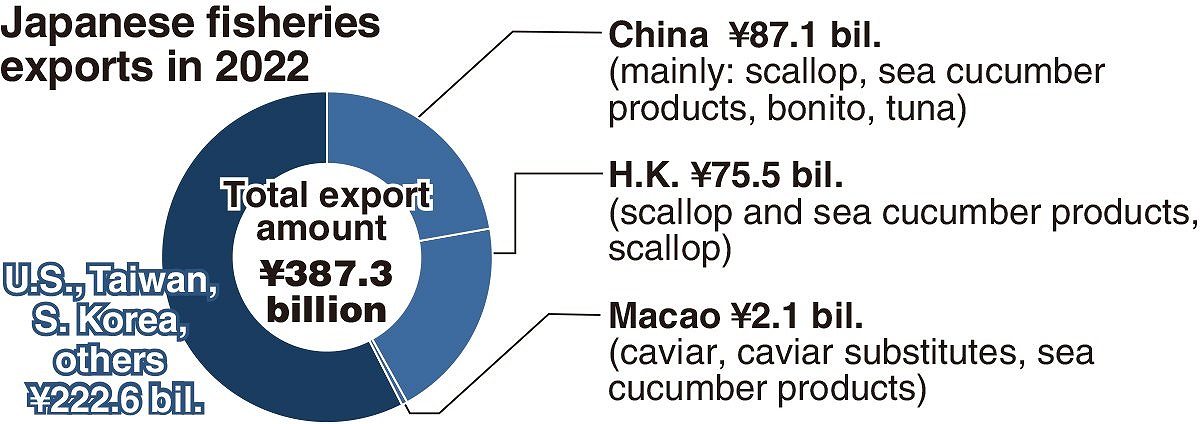China’s Seafood Import Ban Could Have Major Repercussions; Japanese Fishermen Express Concern

16:40 JST, August 25, 2023
The Chinese government’s ban on importing seafood from Japan is expected to have a major negative effect, given that China is Japan’s largest seafood importer. The Japanese government intends to confirm the safety of seafood through daily inspections and other measures, but China’s unfounded action could increase the damage caused by misinformation.
Japanese seafood exports totaled ¥387.3 billion in 2022, with China, Hong Kong and Macao accounting for ¥164.7 billion, or more than 40%. By country and region, China and Hong Kong rank first and second, respectively, in terms of export value.
China is the main export destination for scallops, abalone and related products. A 73-year-old man from a fishing cooperative in Ofunato, Iwate Prefecture, who fishes abalone, is concerned about the impact before the fishing season opens in November.
“We may have to rethink the market itself,” he said, since about 70% of landings are exported as dried abalone to China each year.
The Fisheries Agency will take daily samples of fish and shellfish to check the concentration of tritium, a radioactive material, for a month after the start of the discharge of treated water. The results are expected to be announced within two days in order to curb harmful misinformation.
“We will do our utmost to ensure safety and security through transparent disclosure of data and to support the continuation of the fishing industry,” Economy, Trade and Industry Minister Yasutoshi Nishimura said Thursday.
However, if the largest importer bans imports, market prices may fall, or it may become impossible to secure buyers even after the marine products are found to be safe.
Fishermen quite a distance from Fukushima Prefecture also voiced their concerns, with one in Kagoshima Prefecture saying, “Shipments could be delayed” and another in Kochi Prefecture saying, “[The import ban] could lead to a drop in overall prices of marine products, including popular fish species.”
“We will confirm the status of trading conditions and if there is any damage related to exports, we will compensate appropriately,” said Tokyo Electric Power Company Holdings Inc. President Tomoaki Kobayakawa.
Top Articles in Business
-

Prudential Life Insurance Plans to Fully Compensate for Damages Caused by Fraudulent Actions Without Waiting for Third-Party Committee Review
-

Narita Airport, Startup in Japan Demonstrate Machine to Compress Clothes for Tourists to Prevent People from Abandoning Suitcases
-

Japan, U.S. Name 3 Inaugural Investment Projects; Reached Agreement After Considerable Difficulty
-

Toyota Motor Group Firm to Sell Clean Energy Greenhouses for Strawberries
-

SoftBank Launches AI Service for Call Centers That Converts Harsh Customer Voices into Softer Voices
JN ACCESS RANKING
-

Japan PM Takaichi’s Cabinet Resigns en Masse
-

Japan Institute to Use Domestic Commercial Optical Lattice Clock to Set Japan Standard Time
-

Israeli Ambassador to Japan Speaks about Japan’s Role in the Reconstruction of Gaza
-

Man Infected with Measles Reportedly Dined at Restaurant in Tokyo Station
-

Videos Plagiarized, Reposted with False Subtitles Claiming ‘Ryukyu Belongs to China’; Anti-China False Information Also Posted in Japan






















